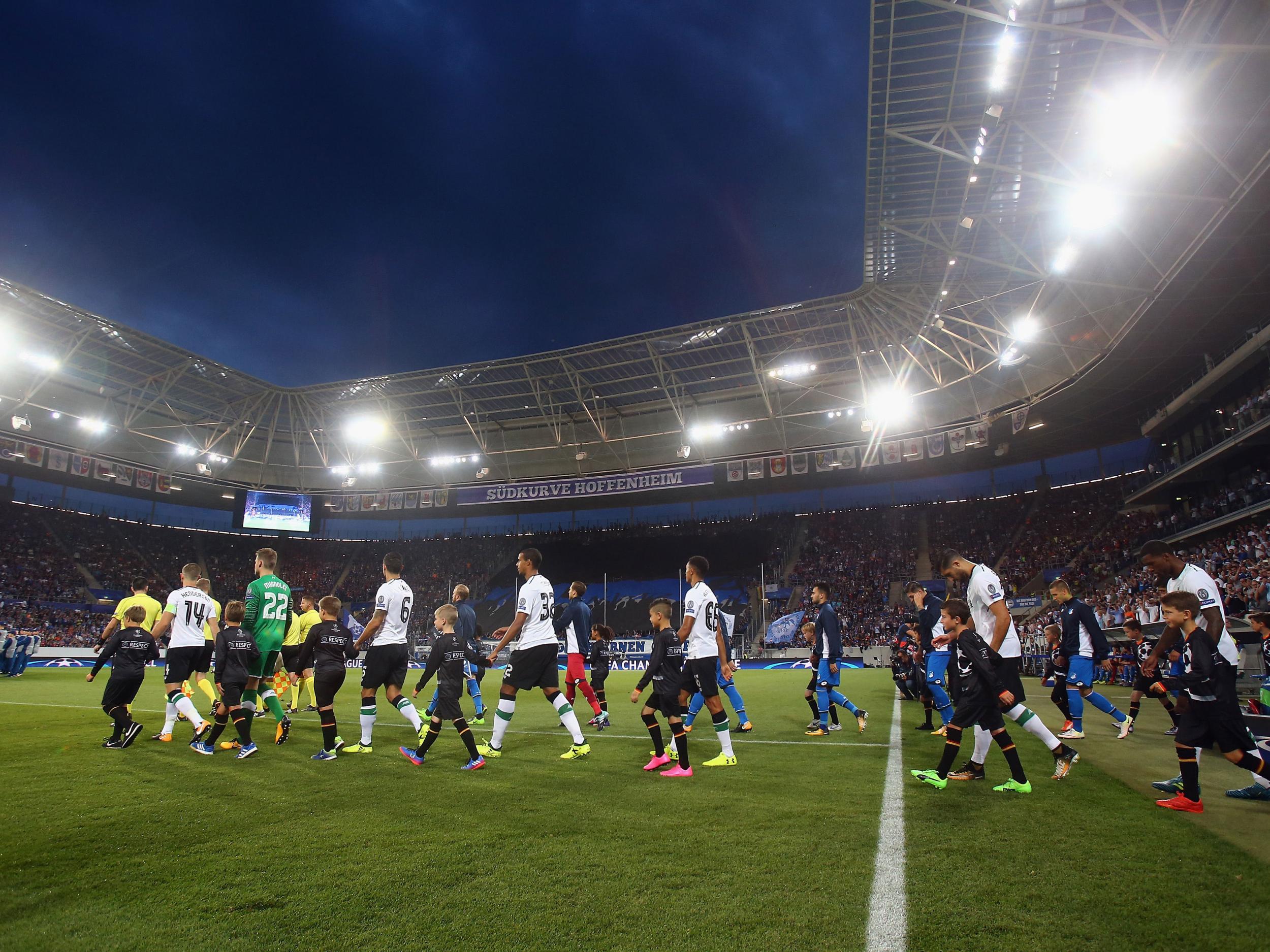How Hoffenheim went from Germany's lower leagues to a Champions League night in Liverpool
Once considered a small club, Hoffenheim have built themselves on big ideas

Your support helps us to tell the story
From reproductive rights to climate change to Big Tech, The Independent is on the ground when the story is developing. Whether it's investigating the financials of Elon Musk's pro-Trump PAC or producing our latest documentary, 'The A Word', which shines a light on the American women fighting for reproductive rights, we know how important it is to parse out the facts from the messaging.
At such a critical moment in US history, we need reporters on the ground. Your donation allows us to keep sending journalists to speak to both sides of the story.
The Independent is trusted by Americans across the entire political spectrum. And unlike many other quality news outlets, we choose not to lock Americans out of our reporting and analysis with paywalls. We believe quality journalism should be available to everyone, paid for by those who can afford it.
Your support makes all the difference.Give or take a few hundred, the population of Hoffenheim could just about squeeze into Anfield’s average away allocation. The football club which bears the name of the 3,272-strong village has no prior experience of competing at the continental level and, if not for an inspired managerial appointment early last year, it would probably still be playing second-tier football in Germany. Why then was there such trepidation among Liverpool supporters, the club’s manager Jürgen Klopp and his players when this tie was made.
Firstly, this is no village team. “It's a club for the whole Rhein-Neckar region,” explains Lutz Pfannenstiel, Hoffenheim’s head of international relations and scouting. “It’s Heidelberg, it’s Sinsheim, it’s Hoffenheim. It's a bigger group of people that are watching.” The 30,150-capacity Rhein-Neckar Arena, a modern stadium constructed in 2007, is a testament to that. Last season, Hoffenheim filled it just as much as more established clubs with Champions League experience like Bayer Leverkusen and Wolfsburg filled their own.
Their modest background cannot be denied, though. A lower-league outfit at the turn of the century, Hoffenheim’s climb through the divisions can be largely attributed to investment from the software businessman Dietmar Hopp, who calls the village home. His company SAP, which also has a partnership in place with Manchester City, is at the heart of the operation. Its money and its resources have made a nine-year stay in the Bundesliga possible and are behind every aspect of the club’s day-to-day work.
Hoffenheim are, for example, one of the few clubs in the world to have their own Footbonaut, a ‘passing machine’ popularised during Borussia Dortmund’s period of success with Klopp. It is essentially a large caged football pitch which propels balls at different heights and angles. The player, stood in the centre of the cage, should attempt to control the ball and then accurately pass it to one of 64 targets, all while her performance is tracked and analysed. The Helix, a computer simulation which measures a player’s concentration and awareness, is another high-end system at the forefront of football coaching found at the club’s quiet, secluded training base.
Scouting and recruitment are no different, with the statistical output of opponents and potential transfer targets analysed thoroughly before matches are played and signings are made. “Data is important, data plays a big role and it is something which helps you to find the right players,” says Pfannenstiel, but with a caveat. “At the end of the day they still need to play football and you still need to watch them play football.
“I wouldn't call it a sensation because we've worked really hard in the last nine years to achieve this,” he adds, stressing that for all the innovation, long hours of old-fashioned labour have helped just as much. “To have achieved our best position ever automatically allows us to play international football. It's just something I think that everybody was reading about, everybody was hoping for, everybody was working for. Now the day is here.

“Obviously we are not spending money like the big clubs in Germany so we are really focusing on our youth development, on our academy. There is a big number of players like Niklas Sule [sold to Bayern Munich this summer for £18m], [Jeremy] Toljan, [Nadiem] Amiri, [Philipp] Ochs who all came from our Under-17s and Under-19s. That's what we want to keep on doing: develop our own guys, but also sign players for less money who increase their market value. This is how we are working.”
Still, it cannot be ignored that all this good groundwork was at risk of being tarnished by relegation less than 18 months ago until the appointment of Julian Nagelsmann, the club’s 30-year-old head coach who is younger than four members of his current first-team squad. After taking the helm in February 2016, Nagelsmann gradually steered them to safety. Hoffenheim were not beaten at home for the entirety of the following campaign and, on their way to a top-four finish, conceded fewest goals of any club bar champions Bayern.
The young coach’s success has seen a ‘Nagelsmann effect’ take hold in the Bundesliga, with Schalke 04 among the clubs to follow the example set at the Rhein-Neckar by appointing the 31-year-old Domenico Tedesco. At other clubs, and in more conservative football cultures, to hire such a relatively inexperienced coaches would be seen as a risk but Pfannenstiel could not disagree more.

“I do not think at all that we are a club that takes risks,” he insists. “It's more that we are working in a structure, where we know what resources we have and what we want to really do.” The decision was an informed one, based upon Nagelsmann’s track record of success in Hoffenheim’s youth system and his promotion chimed with one of the club’s key principles.
“For us, it is a major focus to develop,” Pfannenstiel adds. “That shouldn't change whether we're in the Champions League, the Europa League or if we're not playing in Europe at all. That stamp will stay on the club.”
Overall, it is an impressive picture and Liverpool’s slender first-leg victory is a result which only looks better when their opponents’ strength at home has been fully taken into account. Hoffenheim, 2-1 down in the tie, have an uphill task in reaching the Champions League group stages at the first time of asking but this once-small club is built on big ideas. A second-leg comeback and a famous scalp is far from beyond them.
Join our commenting forum
Join thought-provoking conversations, follow other Independent readers and see their replies
Comments